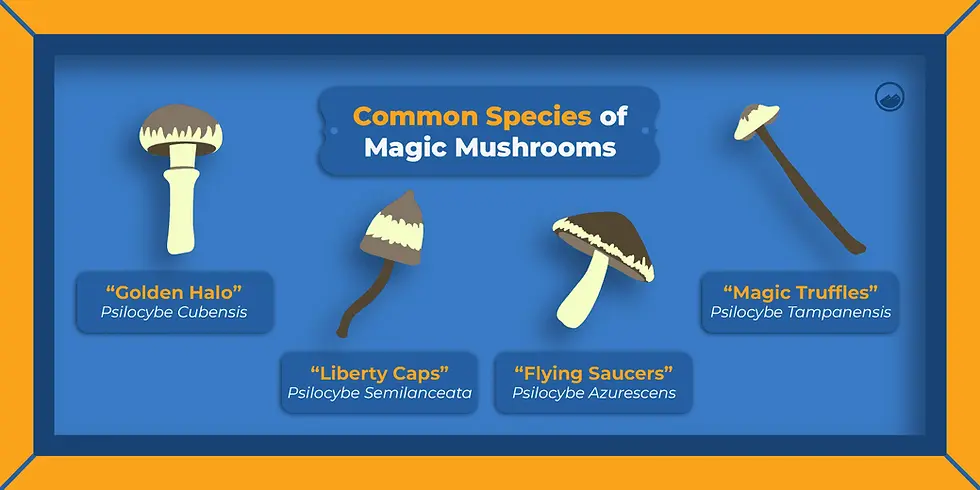The Therapeutic Potential and Risks of Psilocybin and Psilocin for PTSD Treatment
- Jason T

- Jun 25, 2024
- 3 min read
Updated: Nov 3, 2024
Psilocybin and psilocin, the active compounds found in magic mushrooms, have garnered significant attention for their potential therapeutic effects, particularly in treating mental health conditions such as Post-Traumatic Stress Disorder (PTSD). This interest is rooted in both historical usage and contemporary scientific research, revealing a complex interplay between benefits and risks.

Psilocybin and Psilocin: An Overview
Psilocybin and psilocin are naturally occurring psychedelics found in certain species of mushrooms. Upon ingestion, psilocybin is converted into psilocin, which exerts psychoactive effects by interacting with serotonin receptors in the brain. These interactions can lead to altered perception, mood, and cognitive processes .
Potential Benefits for PTSD Patients
Research has indicated that psilocybin and psilocin could be groundbreaking in the treatment of PTSD. The traditional treatments for PTSD, such as psychotherapy and medication, often have limited efficacy and can come with significant side effects. Psilocybin offers a novel approach by facilitating profound psychological experiences that may help patients process traumatic memories more effectively.
Emotional Processing: Studies have shown that psilocybin can enhance emotional processing, allowing patients to confront and integrate traumatic memories in a therapeutic setting .
Neuroplasticity: Psilocybin has been observed to promote neuroplasticity, which is the brain's ability to reorganize itself by forming new neural connections. This can be particularly beneficial for PTSD patients whose trauma has led to rigid and maladaptive neural pathways .
Reduction in Symptoms: Clinical trials have demonstrated that psilocybin-assisted therapy can lead to significant reductions in PTSD symptoms, including anxiety, depression, and avoidance behaviors. These improvements often persist long after the psychedelic experience itself .
Potential Side Effects
Despite the promising benefits, psilocybin and psilocin are not without their risks. The psychoactive nature of these compounds means that they can induce intense and sometimes overwhelming experiences.
Psychological Distress: In some cases, individuals may experience acute anxiety, paranoia, or panic during a psilocybin session. These adverse reactions, often termed "bad trips," can be distressing and may require professional intervention .
Long-term Psychological Effects: While rare, there is the potential for long-term psychological effects, including persistent changes in perception and mood. For individuals with a predisposition to mental health disorders, these changes could exacerbate existing conditions .
Physical Side Effects: Psilocybin can cause physical side effects such as nausea, dizziness, and increased heart rate. Although typically mild, these effects can add to the discomfort during the psychedelic experience .
Conclusion
The exploration of psilocybin and psilocin as therapeutic agents for PTSD offers a beacon of hope for those who have not found relief through traditional treatments. The capacity of these compounds to facilitate deep emotional processing and promote neuroplasticity underscores their potential as powerful tools in mental health therapy. However, the associated risks, particularly the possibility of acute psychological distress and other side effects, necessitate careful consideration and professional guidance.
As research continues to unfold, it is essential to balance optimism with caution, ensuring that the therapeutic use of psilocybin is approached with the rigor and respect it demands. For those considering this treatment, it is crucial to do so under the supervision of trained healthcare professionals to mitigate risks and maximize potential benefits.
RESOURCES
Adults who microdose psychedelics report health related motivations and lower levels of anxiety and depression compared to non-microdosers | Scientific Reports (nature.com)
Psychoactive Drugs in the Management of Post Traumatic Stress Disorder: A Promising New Horizon - PMC (nih.gov)
Why Psychedelic Drugs May Become a Key Treatment for PTSD and Depression | Smithsonian (smithsonianmag.com)
Government of Canada invests nearly $3 million to study the potential benefits of psilocybin-assisted psychotherapy - Canada.ca

Author - Saving Grace Medical Academy Ltd
Jason T
Retired EMT - Heart & Stroke Foundation Senior Instructor










